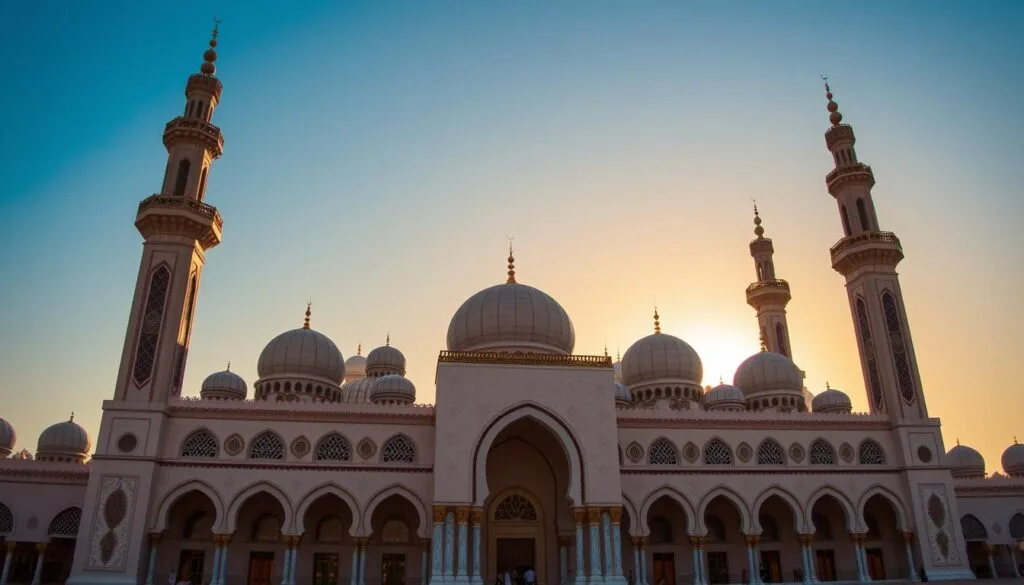As Ramadan 2025 approaches, Dubai shines brightly. This city in the United Arab Emirates has become a special place for those wanting to dive into Islamic traditions. From 28th February to 30th March, Dubai buzzes with devotion, community, and self-reflection. It’s a chance to explore your spirituality and learn about different cultures.
Key Takeaways
- Ramadan in Dubai offers a unique spiritual and cultural experience for visitors.
- The city adapts to the holy month with shortened work hours and a slower pace of life.
- Ramadan emphasises reflection, prayer, and community, with increased charity and Quran recitation.
- Visitors can witness the transformation of Dubai from quiet days to festive nights.
- Exploring Dubai’s mosques during Ramadan provides a deeper understanding of Islamic culture and traditions.
Understanding Ramadan in Dubai: Traditions and Significance
Ramadan is the ninth month of the Islamic calendar. It’s a time when Muslims fast from dawn to dusk. This fasting is a way to purify souls and grow closer to Allah.
The Spiritual Essence of Ramadan
In Dubai, Ramadan brings a surge in spiritual activities. People pray more, read the Qur’an, and attend religious talks. The Taraweeh prayers, held at night, draw big crowds to mosques.
Dubai’s Cultural Response to the Holy Month
Dubai welcomes Ramadan with open arms. It changes its culture to fit its people’s fasting and spiritual needs. Work hours are shortened to help those fasting.
Charity is big during Ramadan. People give to the poor and host Iftar meals. Both Muslims and non-Muslims show respect for Ramadan and follow specific rules.
Key Dates and Timings for Ramadan 2024
- Start of Ramadan 2024: 12 March
- Eid al-Fitr 2024: 10 April
Dubai’s life changes during Ramadan. Schedules and traffic patterns adjust to fasting. The city also sees more religious tourism and spiritual journeys.
Guide to Fasting and Exploring Dubai’s Mosques
Ramadan is the ninth month of the Islamic calendar, a time of deep spiritual meaning. Dubai becomes lively during Ramadan, drawing tourists to its culture and architecture. Visitors can explore Dubai’s stunning mosques, each with its history and beauty.
The Sheikh Zayed Grand Mosque is a highlight in Dubai. It has over 80 domes, beautiful floral designs, and stunning marble. It’s open from 9 am to 10 pm on weekends, with Fridays for worshippers. You can get in for free with an e-pass.
For the best view, visit about 2 hours before sunset. Modest clothes are needed, and there are free tours to learn more about the mosque.
- Modest clothing is required, and free guided tours are available for those seeking a deeper understanding of the mosque’s history and significance.
- Other notable mosques in Dubai include the Jumeirah Mosque, Khalifa Al Tajer Mosque, and Al Farooq Omar Bin Al Khattab Mosque.
- Visitors can easily access these religious sites using Dubai’s extensive public transportation network, with bus routes #24 and #94 providing convenient access.
Visiting mosques in Dubai during Ramadan is special. It lets you see the city’s religious sites and dubai architecture. You also learn about mosque etiquette for a respectful visit.
“Ramadan in Dubai is a time of spiritual renewal, community gathering, and cultural celebration. The city’s mosques stand as beacons of faith, inviting visitors to connect with the historical mosques and deeply rooted traditions of the region.”

Visitor’s Guide to Ramadan Etiquette and Customs
Ramadan is a holy month in the Islamic calendar. It’s a time for spiritual reflection, charity, and coming together in Dubai. As a visitor, respecting local culture can enrich your experience and help you connect with people.
Dress Code and Public Behaviour
It’s key to dress modestly during Ramadan. Make sure your shoulders and knees are covered. Avoid clothes that are too revealing or might offend.
Also, public displays of affection and loud music should be kept to a minimum. These can disrupt the respectful mood of the month.
Dining and Social Protocols
Don’t eat, drink, or smoke in public during the day. This shows respect for those fasting. Many restaurants offer special menus after sunset, letting you try local foods.
Getting involved in charity and cultural events is a great way to bond with the community.
Cultural Sensitivity Guidelines
Be aware of prayer times, especially at sunset. This is a crucial moment for the community. Try not to plan activities that clash with these times.
Also, know the local laws. Eating in public during fasting hours can lead to fines up to AED 2000 or even jail.
By embracing Ramadan’s spirit and following local customs, you can have a memorable experience in Dubai. Dive into the faith, community events, and the unique vibe of this special month.

Experiencing Iftar and Suhoor in Dubai
As the sun sets in Dubai during Ramadan, the air buzzes with excitement. This is Iftar time, the sunset meal that ends the day’s fast. Families and friends come together to enjoy halal cuisine, dates, and Arabian coffee.
Dubai’s hotels and restaurants host grand Iftar feasts. For AED 60, guests can try a variety of Arabic dishes. You’ll find everything from grilled meats to fragrant rice and refreshing salads.
For a deeper experience, visit the Sheikh Mohammed Centre for Cultural Understanding or Dubai Opera. Here, you can see the traditional cannon firing that signals Iftar. These places offer special dining experiences, letting you try local foods while learning about Ramadan.
As night falls, Suhoor begins, the pre-dawn meal before fasting starts. Ramadan tents pop up, offering a warm place for a final meal with loved ones. These tents serve delicious food, shisha, live music, and more, diving you into Dubai’s culture.
Dubai also hosts many Ramadan events and activities. There are night markets with Arabian cuisine and crafts, and the Ramadan RWAQ festivities at the JBR Walk. These offer a chance to feel the spirit of Ramadan and connect with the community.
Conclusion
Visiting Dubai during Ramadan is a special experience. The city mixes old traditions with new comforts. This lets visitors dive into the celebrations and enjoy Dubai’s lively scene.
Be sure to follow local customs and etiquette. This way, you show respect for the holy month. Dubai’s Ramadan offers and events make the city come alive at night.
Feel the city’s warmth as you see the ramadan practices and community spirit. Enjoy halal dining and visit stunning mosques. Your trip to Dubai during Ramadan will touch your heart and mind.
The Dubai tourism industry makes sure visitors can experience Ramadan’s spirit. At the same time, they enjoy modern comforts and cultural spots. Respect local traditions and dive into the celebrations. Let Dubai’s Ramadan magic create unforgettable memories for you.


